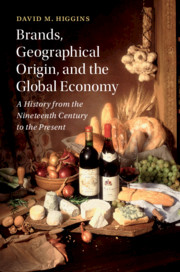Refine search
Actions for selected content:
26946 results in Economic history
7 - The Evolving International Framework for the Protection of IGOs after 1945
-
- Book:
- Brands, Geographical Origin, and the Global Economy
- Published online:
- 25 May 2018
- Print publication:
- 26 May 2018, pp 185-217
-
- Chapter
- Export citation
Bibliography
-
- Book:
- Brands, Geographical Origin, and the Global Economy
- Published online:
- 25 May 2018
- Print publication:
- 26 May 2018, pp 296-325
-
- Chapter
- Export citation
4 - Cooperation, Country of Origin, and Agricultural Trade during the Interwar Period
-
- Book:
- Brands, Geographical Origin, and the Global Economy
- Published online:
- 25 May 2018
- Print publication:
- 26 May 2018, pp 85-123
-
- Chapter
- Export citation
2 - Firms and Indications of Geographical Origin in the First Global Economy
-
- Book:
- Brands, Geographical Origin, and the Global Economy
- Published online:
- 25 May 2018
- Print publication:
- 26 May 2018, pp 29-56
-
- Chapter
- Export citation
10 - Reflections on the History of IGOs
-
- Book:
- Brands, Geographical Origin, and the Global Economy
- Published online:
- 25 May 2018
- Print publication:
- 26 May 2018, pp 285-295
-
- Chapter
- Export citation
1 - Geographical Origin in the Global Economy
-
- Book:
- Brands, Geographical Origin, and the Global Economy
- Published online:
- 25 May 2018
- Print publication:
- 26 May 2018, pp 1-28
-
- Chapter
- Export citation
5 - ‘Unfair Competition’ and the British Merchandise Marks Act, 1926
-
- Book:
- Brands, Geographical Origin, and the Global Economy
- Published online:
- 25 May 2018
- Print publication:
- 26 May 2018, pp 124-156
-
- Chapter
- Export citation

Brands, Geographical Origin, and the Global Economy
- A History from the Nineteenth Century to the Present
-
- Published online:
- 25 May 2018
- Print publication:
- 26 May 2018
7 - Four Hundred Years of Central Banking in the Netherlands, 1609–2016
-
-
- Book:
- Sveriges Riksbank and the History of Central Banking
- Published online:
- 10 May 2018
- Print publication:
- 24 May 2018, pp 242-264
-
- Chapter
- Export citation
11 - The Two Eras of Central Banking in the United States
-
-
- Book:
- Sveriges Riksbank and the History of Central Banking
- Published online:
- 10 May 2018
- Print publication:
- 24 May 2018, pp 361-387
-
- Chapter
- Export citation
8 - Norges Bank 1816–2016: A History of a Small Independent Central Bank
-
-
- Book:
- Sveriges Riksbank and the History of Central Banking
- Published online:
- 10 May 2018
- Print publication:
- 24 May 2018, pp 265-297
-
- Chapter
- Export citation
Figures
-
- Book:
- Sveriges Riksbank and the History of Central Banking
- Published online:
- 10 May 2018
- Print publication:
- 24 May 2018, pp ix-xii
-
- Chapter
- Export citation
5 - The Bank of Spain, 1782–2017: A History
-
-
- Book:
- Sveriges Riksbank and the History of Central Banking
- Published online:
- 10 May 2018
- Print publication:
- 24 May 2018, pp 172-205
-
- Chapter
- Export citation
Tables
-
- Book:
- Sveriges Riksbank and the History of Central Banking
- Published online:
- 10 May 2018
- Print publication:
- 24 May 2018, pp xiii-xiv
-
- Chapter
- Export citation
10 - A History of the Bank of Japan, 1882–2016
-
-
- Book:
- Sveriges Riksbank and the History of Central Banking
- Published online:
- 10 May 2018
- Print publication:
- 24 May 2018, pp 328-360
-
- Chapter
- Export citation
6 - The Other Way: A Narrative History of the Bank of France
-
-
- Book:
- Sveriges Riksbank and the History of Central Banking
- Published online:
- 10 May 2018
- Print publication:
- 24 May 2018, pp 206-241
-
- Chapter
- Export citation
3 - Sveriges Riksbank: 350 Years in the Making
-
-
- Book:
- Sveriges Riksbank and the History of Central Banking
- Published online:
- 10 May 2018
- Print publication:
- 24 May 2018, pp 90-142
-
- Chapter
- Export citation
12 - The Struggle of German Central Banks to Maintain Price Stability
-
-
- Book:
- Sveriges Riksbank and the History of Central Banking
- Published online:
- 10 May 2018
- Print publication:
- 24 May 2018, pp 388-417
-
- Chapter
- Export citation
4 - The Bank of England, 1694–2017
-
-
- Book:
- Sveriges Riksbank and the History of Central Banking
- Published online:
- 10 May 2018
- Print publication:
- 24 May 2018, pp 143-171
-
- Chapter
- Export citation
14 - The European Central Bank
-
-
- Book:
- Sveriges Riksbank and the History of Central Banking
- Published online:
- 10 May 2018
- Print publication:
- 24 May 2018, pp 454-488
-
- Chapter
- Export citation
